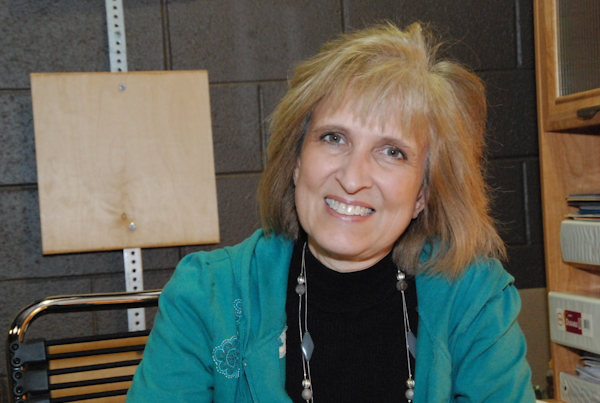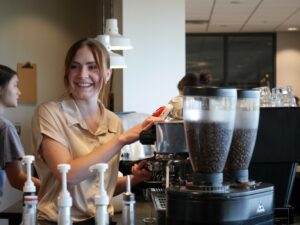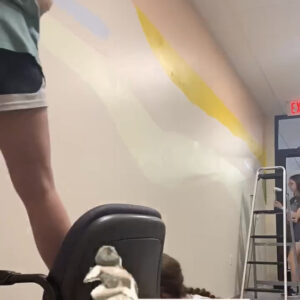Photo by: Henoc Kivuye
English professor Gail Nash has received a research grant to travel to Wisconsin and register for a workshop called “Transana.”
“Transana is a database that holds audio recordings,” Nash said. “The whole point of the grant is to complete some research I started with my daughter, Morgan Nash. What we are studying is the effect of the tutorial on the student revision. The students turned in the rough draft to me and gave another copy to Morgan. They sat down for 30 minutes and got feedback in sessions that we recorded.”
From that session, students went immediately to a post-revision timeslot, where they worked on the revisions for a minimum of 30 minutes based on the session. They then handed in that copy to Nash.
“Morgan and I presented preliminary findings from that research at the International Writing Center’s Conference last fall in San Diego,” Nash said. “We only transcribed three of the nine students to get the data, so I applied for the funding to finish transcribing the other six and get some more concrete data using the program Transana.
The grant came from the International Writing Center Association. It exists to provide support to writing centers around the world. Nash received a grant for $750. She plans to use the grant to fund her trip to the conference in Wisconsin.
Students who have had a class taught by Nash seem to know how much effort she puts into the writing center.
“I’ve had Dr. Nash in class before, and from what I’ve seen, the writing center is really important to her,” junior Shelby Stanaland said. “I can tell she really puts a lot of stock in it, and she meets with the workers once a week to make sure they’re doing the best they can.”
According to Nash, a lot of research exists for discussing things like student and tutor attitude, but very little on what sort of changes students make after a tutoring session. Nash plans on filling this gap with her research.
“The research is unique because we have the pre-tutorial draft, the immediate post-tutorial draft and the final one as well,” Nash said. “A lot of writing center research doesn’t have that tightly controlled of a study. When we did our literature review, we only found nine studies that even tried to investigate what revisions students make after a tutorial.”
For students worried about going to the writing center, those who have used this service before said it is all very relaxed.
“Going to the writing center was extremely beneficial,” junior Amanda Arnold said. “It was very professional. I didn’t feel like they were looking down on me, and they had respect for me, which I really liked. It felt like just a peer-to-peer review of my paper.”
Nash said that her ultimate goal is to attend the workshop, get the recordings transcribed and start writing an article for publication in the next year or so. Nash’s data might change the way tutors go about helping students with their papers.
“One of the things we found out was that when the tutor was very specific in changes, the students almost always made the changes,” Nash said. “If the tutor was vague or general and gave a website or something like that it either didn’t get changed or got changed incorrectly. I’m not sure if it’s because students didn’t go to the website or they didn’t understand it at all, but that’s what we found.”
Nash said that the data will not count for everyone, but it will provide a head start into some research that is not published yet. She hopes that it will help improve the way tutors help students without directly giving them the answers.
“I hope this data adds to the research base that’s missing,” Nash said. “This is a small study, and you can’t generalize for every writing center, but it will be some hard, empirical data that shows the result of these students attending a writing session. I hope that the data will affect the way we train our tutors. I think there is a place for telling students exactly what is wrong, but I hope this data will show when that time is.”
Stanaland has used the writing center before, but suggests that maybe she has not taken advantage of this resource as much as she should.
“I know sometimes I feel intimidated, but the point is to get better, not to get embarrassed,” Stanaland said. “They’re there to help you. They help out with grammar and help you get your thoughts together and put your ideas on paper.”
For students who may need that extra help with their papers, they can go online to schedule an appointment; workers are also available to help out by answering questions.















Be First to Comment